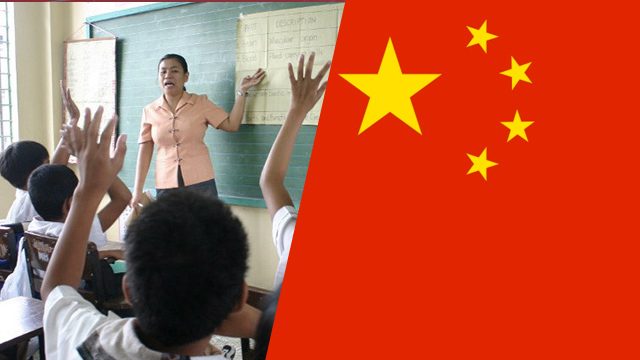SUMMARY
This is AI generated summarization, which may have errors. For context, always refer to the full article.

BEIJING, China – China plans to hire more English teachers and domestic workers from the Philippines amid stronger bilateral ties between the two countries under the Duterte administration.
Philippine Ambassador to China Jose Santiago Sta Romana said China has expanded the list of countries that can teach the foreign language in its schools.
“China is now planning to open opportunities for Filipinos’ legitimate employment as English teachers. They expanded [their] definition of English-speaking countries. They said native-speaking countries and countries that were colonized by these English-speaking countries,” Sta Romana told reporters at the Philippine embassy in Beijing on Tuesday, July 11.
He said the Philippines is covered under the expanded definition since the Philippines was a US colony and English is taught and spoken widely in the country.
While there are already Filipino teachers in China, the ambassador said most are teaching at the preschool and grade school levels.
China now wants to hire more Filipinos to teach in its universities.
“They laid the groundwork…meaning college degrees particularly in teaching English or education that you can actually teach not only in elementary and high school and also in the university if you have that competitive degree,” he said.
China has yet to specify the number of teachers from the Philippines, as the envoy said negotiations are still ongoing. But he is confident it will “soon” be finalized.
More job opportunities
Aside from this, Sta Romana said China is also planning to hire “English-speaking” Filipino domestic workers.
The Chinese, he said, have learned from Hong Kong, where thousands of Filipino domestic workers are helping families raise children.
“The Chinese upper middle class are learning from Hong Kong. They want to hire nannies who can teach their kids English, so English-speaking domestics,” he said.
“But perhaps not in the same scale as HK kasi (because) there’s a surplus of Chinese labor that you’re competing with so it’s very tight, the control, but they’re loosening it,” he added.
Sta Romana credited this development to the good relations between China and the Philippines under Duterte.
“That is part of it. In a sense, what they are trying to do is trying to see how they can help out. You know the basic approach is how to help out in Philippine development,” he said.
Duterte has taken a softer stance toward China compared to his predecessor, Benigno Aquino III, who filed a case against the Asian giant over the West Philippine Sea (South China Sea).
The Philippines won the landmark arbitration case but China refused to recognize the ruling.
Duterte has also refused to raise the controversial issue with China, in exchange for financial assistance and pledges. – Rappler.com
Add a comment
How does this make you feel?
There are no comments yet. Add your comment to start the conversation.